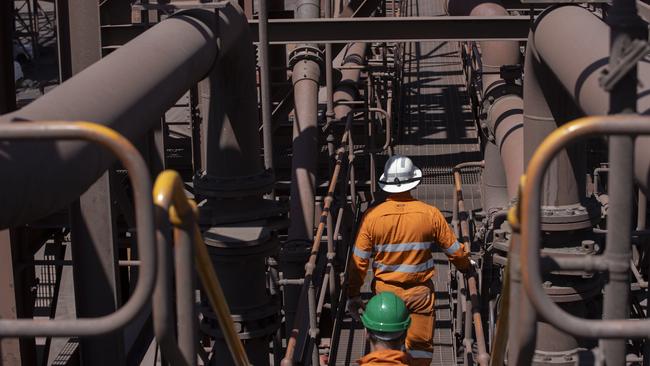Mike Henry changes mind on big deals post $77bn rebuff on Anglo
BHP is questioning the wisdom of large-scale acquisitions in the sector after its $77bn takeover tilt at Anglo American.

BHP has questioned the wisdom of large-scale acquisitions in the mining sector less than nine months after walking away from its $US49bn ($77bn) takeover tilt at rival Anglo American.
Chief executive Mike Henry said on Tuesday that BHP was firmly focused on organic growth options in copper and potash in a strong indication he has moved on from the Anglo rebuff.
“We do evaluate opportunities from time to time, but in the current market it is increasingly challenging to do large global M&A for shareholder value,” he said.
“That’s what BHP is about. At the end of the day, it’s about creating more value for shareholders.
“Just so we’re all clear, our current focus is on our own organic growth. These opportunities are advancing well, they’re attractive, and so that’s where we’re spending our time and effort.”
BHP walked away from its copper-driven bid for Anglo at the end of May last year and Rio Tinto has since been linked to flash-in-the-pan merger talks with Glencore.
In copper, BHP’s first half production increased 10 per cent on the same time last year with the Escondida mine in Chile achieving a 10-year production record.
The mining giant has flagged spending up to $US14bn over a decade to maintain production at its Chilean copper mines and is eying a multi-billion investment on boosting production in South Australia that involve Olympic Dam and the assets it acquired in the $9.6bn takeover of Oz Minerals.

BHP’s first half results revealed a $239m blow out to $912m in the cost of expanding the Prominent Hill, with the work now expected to take almost a year longer to complete after seismic activity at depth and slow going on sinking mining shaft.
The company warned the net debt balance would increase to somewhere near $US15bn – the top end of its target range - by June 30 after it finalised a deal with Lundin Mining for a stake in a prized Chilean copper project and made more payments under the Samarco dam disaster settlement.
Mr Henry played down the potential impact of tariffs imposed by US president Donald Trump on BHP’s $US10.6bn Jansen potash project in Canada.
US farmers rely on Canada for about 80 per cent of their potash requirements, with the Jansen project expect to begin production in 2026.
Mr Henry said BHP was seeing signs of recovery of the Chinese economy despite some of the uncertainty around global trade policies and geopolitical tensions.
“Demand for our products remains healthy, notwithstanding the uncertainty and volatility that we see externally,” he said.
“We are seeing early signs of recovery in China. We’re seeing resilient economic performance in the US and strong growth in India, which is the fastest growing major economy in the world.”




To join the conversation, please log in. Don't have an account? Register
Join the conversation, you are commenting as Logout